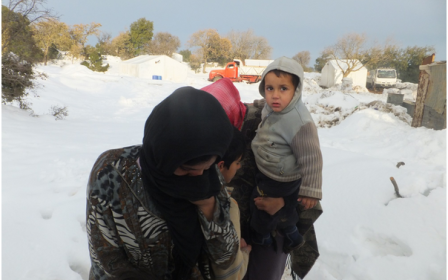Iran warns of 'consequences' for Israeli attack in Syria

Iran has told the United States that Israel should expect consequences for an attack on the Syrian-held side of the Golan Heights that killed an Iranian general, a senior official said Tuesday.
News of the Iranian warning comes as at least two rockets fired from Syria hit the Israeli-occupied area of the Golan Heights on Tuesday, prompting Israeli forces to return fire.
There were no immediate reports of casualties on the Israeli side, nor claims of responsibility.
Israeli military officials said they believed the attack was a joint effort between Hezbollah and the Syrian military, while Lebanese sources said the rockets were aimed at a rebel-run hospital in Syria's Quneitra province, Israeli daily Haaretz reported.
Tensions have risen since an attack along the ceasefire line in the Golan Heights on 18 January killed Iranian Revolutionary Guard General Mohammad Ali Allahdadi and six fighters from Lebanon's Hezbollah group.
Israel has not officially acknowledged carrying out the attack, but was warned last week of an eventual response.
"We have sent a message to the United States through diplomatic channels telling the Americans that the Zionist regime crossed Iran's red lines by this action," said Iran's Deputy Foreign Minister Hossein Amir-Abdollahian.
"In this message, we said those responsible should wait to suffer the consequences of their act," he added, in remarks carried by the official IRNA news agency.
Amir-Abdollahian was speaking on the sidelines of a memorial service for Allahdadi also attended by General Ghassem Souleimani, head of the Guards' elite Quds Force, which is responsible for operations outside Iran.
Last week, Iran's defence minister, Brigadier General Hossein Dehqan, said "this action of Zionists will not be left without a response. The important thing is the question of the time and place of this response."
Mohsen Rezaie, secretary of Iran's Expediency Council, added that Hezbollah would eventually retaliate against "this recent atrocity", but that the group was "prudent and has a long-term plan and will not be infuriated."
Iran is Syrian President Bashar al-Assad's main regional ally in his war against the rebels seeking to overthrow him.
Hezbollah's Al-Manar television said the group's six fighters - including Jihad Mughniyeh, son of slain Hezbollah commander Imad Mughniyeh, who was assassinated in Damascus in February 2008 - were killed on a reconnaissance mission.
But an Israeli security source said the strike was on "terrorists" who were preparing an attack.
The incident came days after Hezbollah chief Hassan Nasrallah threatened to retaliate against Israel for its repeated strikes on targets in Syria, and boasted that the movement was stronger than ever.
Nasrallah touted a sophisticated arsenal, including Fateh-110 missiles, which have a range of at least 200 kilometres, and are capable of striking deep inside Israel.
In 2006, Israel fought a war against Hezbollah that killed more than 1,200 people, mostly Lebanese civilians, and 160 Israelis, mostly soldiers.
Stay informed with MEE's newsletters
Sign up to get the latest alerts, insights and analysis, starting with Turkey Unpacked
Middle East Eye delivers independent and unrivalled coverage and analysis of the Middle East, North Africa and beyond. To learn more about republishing this content and the associated fees, please fill out this form. More about MEE can be found here.





